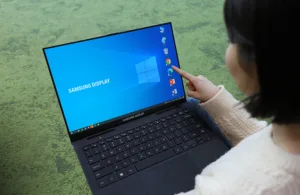Samsung Display announced the successful development of the world’s first large-sized OCTA (On-Cell Touch AMOLED) technology, expanding the technology’s application from smartphone OLED to the laptop OLED panel, with full-scale mass production.
Samsung Display developed OCTA, the world’s first touch-integrated OLED, for smartphones back in 2010. It is a technology that embeds the touch sensor inside the panel instead of attaching a TSP (Touch Screen Panel) film to recognize touch action on the panel surface. The panel is much friendlier to the environment because it doesn’t need additional plastic film for touch. Moreover, the thickness and the weight of the panel are reduced with a simplified structure.
Samsung Display explained that touch film generally accounts for 6-11 percent of the total panel thickness and that the thinner the panel, the better the design expandability and portability of the product. Also, the company has been focusing on developing large-sized OCTA technology as the recent demand for laptops with touchscreen functions has increased with the expansion of the OLED laptop market.
“The difficulty level of the touch-integrated technology surges greatly as the display area increases, which leads to the increased number of touch sensors required,” said Hojung Lee, Head of Product Planning Team for Small and Medium-sized Display Division at Samsung Display. “We were able to achieve the natural feel and touch responsiveness for larger displays through the development of new materials and process technologies.”
Samsung Display plans to first apply its large-sized OCTA technology to Samsung Electronics’ new high-end Galaxy Book model and expects to complement a chic design with high portability. In addition, Samsung Display showcases the panel performance of its products with display features 16:10 ratio, 120-Hz refresh rate and 3K resolution.

